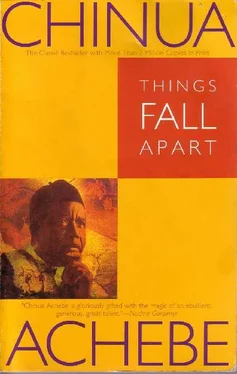Chinua Achebe - Things Fall Apart
Здесь есть возможность читать онлайн «Chinua Achebe - Things Fall Apart» весь текст электронной книги совершенно бесплатно (целиком полную версию без сокращений). В некоторых случаях можно слушать аудио, скачать через торрент в формате fb2 и присутствует краткое содержание. Город: New York, Год выпуска: 1994, Издательство: A DIVISION OF RANDOM HOUSE, INC., Жанр: Контркультура, на английском языке. Описание произведения, (предисловие) а так же отзывы посетителей доступны на портале библиотеки ЛибКат.
- Название:Things Fall Apart
- Автор:
- Издательство:A DIVISION OF RANDOM HOUSE, INC.
- Жанр:
- Год:1994
- Город:New York
- ISBN:нет данных
- Рейтинг книги:2 / 5. Голосов: 2
-
Избранное:Добавить в избранное
- Отзывы:
-
Ваша оценка:
- 40
- 1
- 2
- 3
- 4
- 5
Things Fall Apart: краткое содержание, описание и аннотация
Предлагаем к чтению аннотацию, описание, краткое содержание или предисловие (зависит от того, что написал сам автор книги «Things Fall Apart»). Если вы не нашли необходимую информацию о книге — напишите в комментариях, мы постараемся отыскать её.
—W. B. Yeats, "The Second Coming"
Things Fall Apart — читать онлайн бесплатно полную книгу (весь текст) целиком
Ниже представлен текст книги, разбитый по страницам. Система сохранения места последней прочитанной страницы, позволяет с удобством читать онлайн бесплатно книгу «Things Fall Apart», без необходимости каждый раз заново искать на чём Вы остановились. Поставьте закладку, и сможете в любой момент перейти на страницу, на которой закончили чтение.
Интервал:
Закладка:
When they had all gathered, the white man began l<> speak to them. He spoke through an interpreter who was an Ibo man, though his dialect was different and harsh to the enrs of Mbanta. Many people laughed at his dialect and the way In1 used words strangely. Instead of saying "myself" he always saul "my buttocks." But he was a man of commanding presence mull the clansmen listened to him. He said he was one of them, ,m they could see from his color and his language. The other (ourI
black men were also their brothers, although one of them did not speak Ibo. The white man was also their brother because they were all sons of God. And he told them about this new God, the Creator of all the world and all the men and women. He told them that they worshipped false gods, gods of wood and stone. A deep murmur went through the crowd when he said this. He told them that the true God lived on high and that all men when they died went before Him for judgment. Evil men and all the heathen who in their blindness bowed to wood and stone were thrown into a fire that burned like palm-oil. But good men who worshipped the true God lived forever in His happy kingdom. "We have been sent by this great God to ask you to leave your wicked ways and faLe gods and turn to Him so that you may be saved when you die," he said.
"Your buttocks understand our language," said someone light-heartedly and the crowd laughed.
"What did he say?" the white man asked his interpreter. Hut before he could answer, another man asked a question: "Where is the white man's horse?" he asked. The Ibo evangelists consulted among themselves and decided that the man probably meant bicycle. They told the white man and he smiled benevolently.
"Tell them," he said, "that I shall bring many iron horses when we have settled down among them. Some of them will even ride the iron horse themselves." This was interpreted to I hem but very few of them heard. They were talking excitedly .unong themselves because the white man had said he was H<>ing to live among them. They had not thought about that.
At this point an old man said he had a question. "Which is this god of yours," he asked, "the goddess of the earth, the god of the sky, Amadiora or the thunderbolt, or what?"
The interpreter spoke to the white man and he immediately gave his answer. "All the gods you have named are not gods at all. They are gods of deceit who tell you to kill your fellows and destroy innocent children. There is only one true God and He has the earth, the sky, you and me and all of us."
"If we leave our gods and follow your god," asked another man, "who will protect us from the anger of our neglected gods and ancestors?"
"Your gods are not alive and cannot do you any harm," replied the white man. "They are pieces of wood and stone."
When this was interpreted to the men of Mbanta they broke into derisive laughter. These men must be mad, they said to themselves. How else could they say that Ani and Amadiora were harmless? And Idemili and Ogwugwu too? And some of them began to go away.
Then the missionaries burst into song. It was one of those gay and rollicking tunes of evangelism which had the power of plucking at silent and dusty chords in the heart of an Ibo man. The interpreter explained each verse to the audience, some of whom now stood enthralled. It was a story of brothers who lived in darkness and in fear, ignorant of the love of God. It told of one sheep out on the hills, away from the gates of God and from the tender shepherd's care.
After the singing the interpreter spoke about the Son of God whose name was Jesu Kristi. Okonkwo, who only stayed in the hope that it might come to chasing the men out of the village or whipping them, now said-.
"You told us with your own mouth that there was only one god. Now you talk about his son. He must have a wife, then." The crowd agreed.
"1 did not say He had a wife," said the interpreter, somewhat lamely.
"Your buttocks said he had a son," said the joker. "So he must have a wife and all of them must have buttocks."
The missionary ignored him and went on to talk about the Holy Trinity. At the end of it Okonkwo was fully convinced that the man was mad. He shrugged his shoulders and went away to tap his afternoon palm-wine.
But there was a young lad who had been captivated. His name was Nwoye, Okonkwo's first son. It was not the mad logic of the Trinity that captivated him. He did not understand it. It was the poetry of the new religion, something felt in the marrow. The hymn about brothers who sat in darkness and in fear seemed to answer a vague and persistent question that haunted his young soul—the question of the twins crying in the bush and the question of Ikemefuna who was killed. He lelt a relief within as the hymn poured into his parched soul. The words of the hymn were like the drops of frozen rain melting on the dry palate of the panting earth. Nwoye's callow mind was greatly puzzled.
CHAPTER SEVENTEEN
v,<���…: : The missionaries spent their first four or five nights in the marketplace, and went into the village in the morning to preach the gospel. They asked who Ihe Lg of the village was, but the villagers told them tha .here was no king. "We have men of h,gh tide and the ch,d oriests and the elders," they said.
'„ was not veiy easy getting the men of high tide and the elders together after the excitement of the firs, day. Bu, the aries persevered, and in the end they were received by "– They asked for a plot o, ,and to bu.ld vecan buried all those who died of the really evil diseases, like lep,osy and smallpox. It was also the dumping ground for ,h poten, fetishes of great medicine men when they d,ed. An Cil forest" was, therefore, alive with sinister forces and po«.
I
K of darkness. 1, was such a fores, tha, the rulers of Mbanta g^ve to the missionaries. They did no, really wan, them „, to clan, and so they made them tha, offer which nobody „, his right senses would accept.
"They want a piece of land to build their shrine," said Uchendu to his peers when they consulted among themselves. "We shall give them a piece of land." He paused, and there was a murmur of surprise and disagreement. "Let us give them a portion of the Evil Forest. They boast about victory over death. Let us give them a real battlefield in which to show their victory." They laughed and agreed, and sent for the missionaries, whom they had asked to leave them for a while so that they might "whisper together." They offered them as much of the Evil Forest as they cared to take. And to their greatest amazement the missionaries thanked them and burst into song.
"They do not understand," said some of the elders. "But i hey will understand when they go to their plot of land tomorrow morning." And they dispersed.
The next morning the crazy men actually began to clear a part of the forest and to build their house. The inhabitants of Mbanta expected them all to be dead within four days. The lirst day passed and the second and third and fourth, and none "I them died. Everyone was puzzled. And then it became known that the white man's fetish had unbelievable power. It was said that he wore glasses on his eyes so that he could see ,md talk to evil spirits. Not long after, he won his first three i onverts.
Although Nwoye had been attracted to the new faith horn the very first day, he kept it secret. He dared not go too ьrar the missionaries for fear of his father. But whenever they i sine to preach in the open marketplace or the village play ground, Nwoye was there. And he was already beginning to know some of the simple stories they told.
"We have now built a church," said Mr. Kiaga, the interpreter, who was now in charge of the infant congregation. The white man had gone back to Umuofia, where he built his headquarters and from where he paid regular visits to Mr. Kiaga's congregation at Mbanta.
Читать дальшеИнтервал:
Закладка:
Похожие книги на «Things Fall Apart»
Представляем Вашему вниманию похожие книги на «Things Fall Apart» списком для выбора. Мы отобрали схожую по названию и смыслу литературу в надежде предоставить читателям больше вариантов отыскать новые, интересные, ещё непрочитанные произведения.
Обсуждение, отзывы о книге «Things Fall Apart» и просто собственные мнения читателей. Оставьте ваши комментарии, напишите, что Вы думаете о произведении, его смысле или главных героях. Укажите что конкретно понравилось, а что нет, и почему Вы так считаете.












